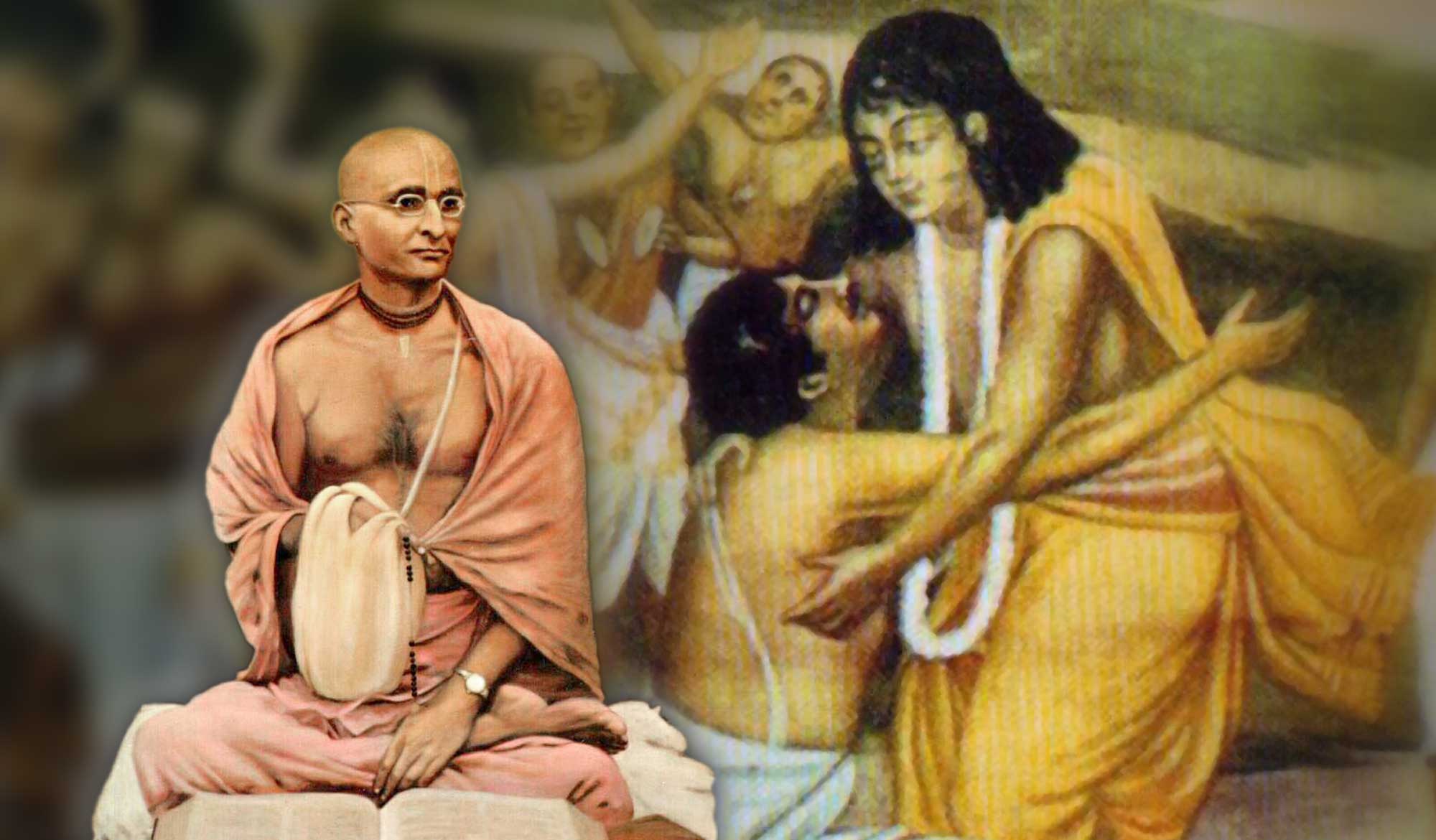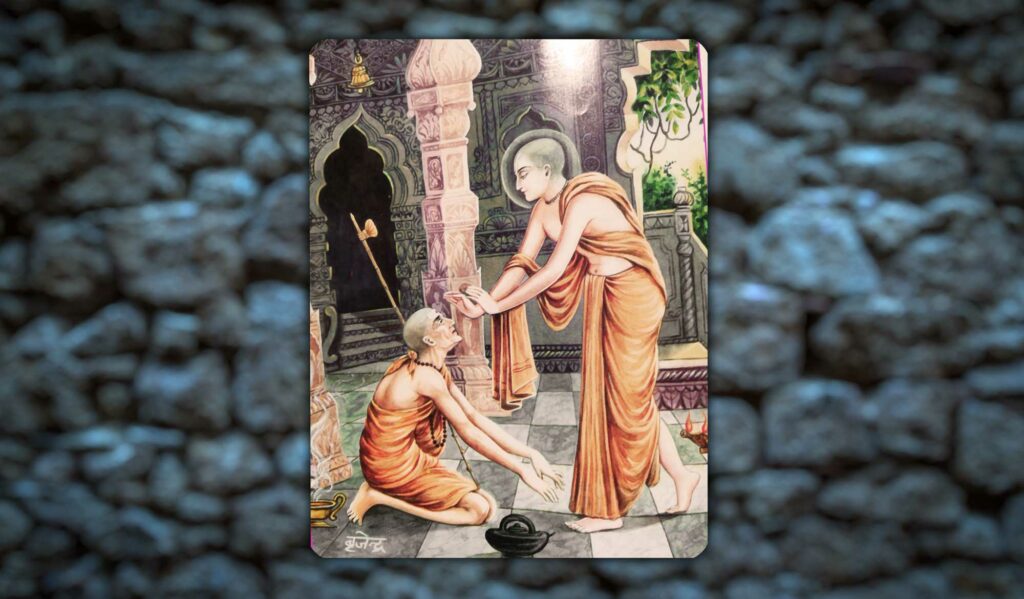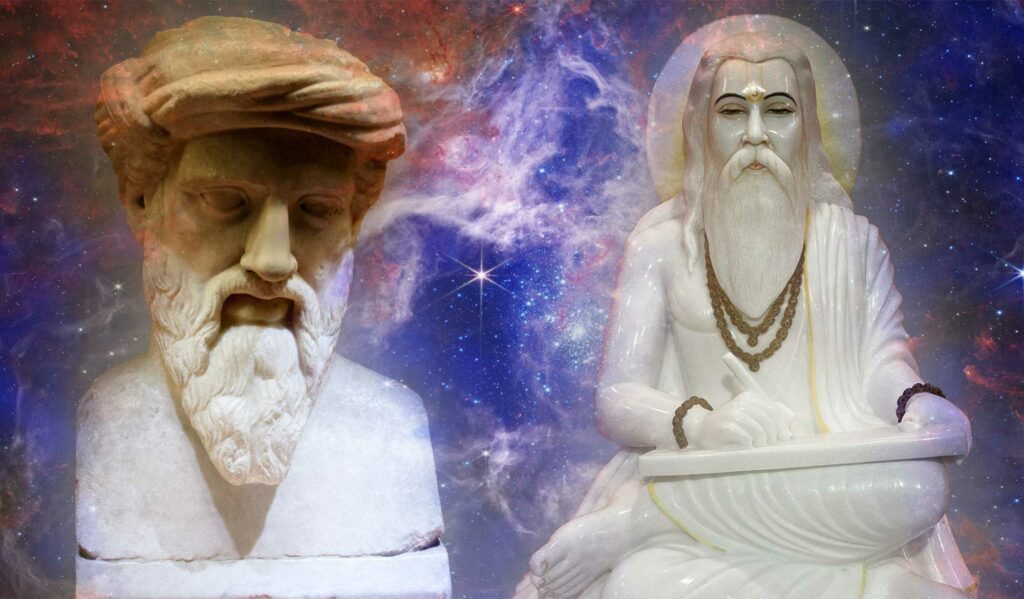Overview
‘Sajjana-Kṛpālu’ (A devotee is Merciful) was the first in a series of articles by Śrīla Bhaktisiddhānta Sarasvatī Ṭhākura Prabhupāda on the twenty-six qualities of a Vaiṣṇava in 1917 and published in Sajjana-Toṣaṇī magazine, Vol. 20, Issue 2. This article explores mercy, the primary quality of a devotee, and illustrates its significance for the followers of Śrī Caitanya.
(Translated from the original Bengali by Swami B.V. Giri and edited by Parameśvarī Dāsī)
Those jīvas who are averse to Hari often cannot comprehend the characteristics of a sajjana (devotee). In their own philosophies which are full of anarthas, they indicate a different meaning to the word ‘sajjana.’ However, Śrīman Mahāprabhu explained the symptoms of a sajjana to Sanātana Gosvāmī in this way:
kṛpālu, akṛta-droha, satya-sāra sama
nirdoṣa, vadānya, mṛdu, śuci, akiñcana
sarvopakāraka, śānta, kṛṣṇaika-śaraṇa
akāma, nirīha, sthira, vijita-ṣaḍ-guṇa
mita-bhuk, apramatta, mānada, amānī
gambhīra, karuṇa, maitra, kavi, dakṣa, maunī
(“A Vaiṣṇava is merciful, non-violent, the essence of truth, equipoised, faultless, munificent, gentle, pure, without material possessions, always engaged in beneficial work for all, calm, surrendered solely to Kṛṣṇa, without desire, indifferent, steady, in control of the six lower qualities, eats only as required, attentive, respectful, never expecting honour, sober, compassionate, friendly, poetic, expert and quiet.” – Caitanya-caritāmṛta, Madhya-līlā 22.78-80)
The first symptom of a Vaiṣṇava is that he is merciful (kṛpālu). Śrī Gaurahari is the worshippable object of the sajjanas, the principle shelter and primary personality of those who are merciful. A person who is averse to Gaura is not capable of actually being merciful, nor qualified to attain the other twenty-five qualities. Śrīmad Bhāgavata says:
yasyāsti bhaktir bhagavaty akiñcanā
sarvair guṇais tatra samāsate surāḥ
harāv abhaktasya kuto mahad-guṇā
manorathenāsati dhāvato bahiḥ
(“The Devas reside with all good qualities in one who has unmotivated bhakti for Bhagavān. But where are the good qualities in the non-devotee whose mind runs after temporary material objects?” – Śrīmad Bhāgavatam 5.18.12)
Those who have transcendental devotion towards Bhagavān or a service-tendency, possess all good qualities. What are the great qualities of one who rejects hari-sevā? The chariot of their mind is constantly running on the path of serving the objects of the senses with the tendency to enjoy, and to attain transient things that are disconnected with Hari. Thus, even if there is a glimmer of some good quality in one who is averse to Hari, such qualities do not remain with him and, in time they all become faults.
Dayānidhi Gaurahari (Gaurahari, the ocean of mercy) is a veritable sea of compassion. Only His pure servants have the characteristics of mercy, and even if a shadow of mercy is seen in others, in reality such ‘mercy’ is simply cruelty. Gaurasundara, the ocean of mercy, has shown mercy to the jīvas in nine ways. Receiving mercy from that Ocean of mercy, Śrī Dāmodara Svarūpa Gosvāmī has composed this in the form of a śloka.* This mercy of Gaurahari is aprākṛta (transcendental), pūrṇa (complete), nitya (eternal), śuddha (pure), mukta (liberating) and caitanya-rasa-mayī (replete with divine conscious mellows), thus no type of adversity can arise in the jīva whatsoever.
- Covered by the three kinds of miserable dust of anyābhilāṣa (desires for other mundane things), karma and jñāna, the bound jīva forgot his own welfare, rejecting the shelter of Gaura’s feet and becoming averse to Him. Dayānidhi Gaurahari took pity on them and easily blew away the dust of the three types of misery, ādhibhautika (miseries caused by other entities), ādhidaivika (miseries caused by natural calamities) and ādhyātmika (miseries caused by oneself) and bestowed upon them the service of His feet, which destroys the threefold miseries.
- The bound jīva has the threefold contaminations of anyābhilāṣa and the coverings of karma and jñāna. In the material world, the carriers of these threefold contaminations, namely the so-called ‘mahājanas’ or role models, have only been cruel to the jīvas, placing them in a perilous situation under the weight of their own contaminations. Under their possessive rule, such śāstra or teachers, place the jīvas within their controlling grasp, and by their expertise they are put under the spell of such narrow-minded mundane limitations, and in this way their hearts become very quarrelsome. Dayānidhi Gaurahari has declared that all such dissension regarding teachers and śāstrika sampradāyas is simply trivial and useless in the spiritual domain. Being engrossed in disputes on śāstra, a jīva will never attain mercy for himself. It is only when one comes to know that Gaurhari is an ocean of mercy that dissension amongst all the śāstra is resolved.
- When the bound jīva takes shelter of pure bhakti, then the ātmā becomes completely satisfied. Service to Kṛṣṇa is the unalloyed bliss of the jīva. When the proclivity for service is directed towards mundane objects, it becomes jñāna, karma or anyābhilāṣa. The advice of rejecting or renouncing them is the mercy of Gaurahari. The endeavour of obtaining the proper conception that in spiritual life there is no path other than bhakti which awakens one’s good fortune is His mercy.
- Only by serving Kṛṣṇa does the jīvātmā become purified of material impurities.
- Recognising bad association as service to māyā, if one rejects that and engages in service to Kṛṣṇa with a sajjana, one becomes free from material rasa and attains aprākṛta-rasa (transcendental mellows).
- If the tendency towards material sense-enjoyment and mundane rasa is abandoned, then the mellows of kṛṣṇa-bhakti-rasa arises and a devotee becomes equipoised.
- When the dust-like misery originating from an absence of Kṛṣṇa is blown away, the uncontaminated pure servitor rejoices, by the mercy of the hlādinī-śakti (Rādhārāṇī, the pleasure-giving potency).
- When bickering over the śāstra subsides and kṛṣṇa-tattva-rasa emerges, then by the mercy of the hlādinī-śakti one becomes intoxicated with divine bliss.
- Engaging in service to Kṛṣna, becoming free from violence and perceiving the ecstasy of Kṛṣṇa everywhere, one becomes situated at the zenith of kṛṣṇa-mādhurya (Kṛṣṇa’s sweetness).
The servants of Śrī Gaurāṅga have received these nine types of mercy from Mahāprabhu, who Himself is an ocean of mercy and thus, in this way they are full of compassion. Therefore, the inherent nature of a devotee is kṛpālu. If he is devoid of mercy, then Dayānidhi Gaura does not accept him as one of His own.
One may become bitter and think, “Why did Śrī Gaurahari not accept the best of the anyābhilāṣīs, karmīs or jñānīs, and only show mercy to the pure servants of Hari? Why did He not approve of the misconduct of those persons devoid of bhakti? By doing this, hasn’t the name ‘Dayānidhi’ become besmirched by some fault?
The prākṛta-sahajiyās who openly pretend to be followers of Dayānidhi Gaura, followers of the compassionate Nityānanda, followers of the merciful Thākura Narottama or followers of the Vaiṣṇava Ṭhākura who is benevolence personified, are expert in self-promotion through hypocrisy – did they not receive any share of the aforementioned nine kinds of mercy?
In answer to this it can be said that such wranglers are not prepared to believe in the mercy of Bhagavān and His devotees. They only consider their own apparently ‘sweet’ selfish sense-enjoyment to be ‘mercy.’ Anyone who disturbs their senses even a little is not a merciful devotee, nor is he Bhagavān. His imaginary ‘Gaurahari’ is not Bhagavān, but merely a puppet whose purpose is to help him pursue his own lusty desires. But the sajjana is merciful. Since the sajjana has rejected the association of the dishonest, he has become very merciful to his own self.
Those whose material intelligence is fully absorbed in being ‘merciful’ to their senses which are averse to Hari, and desiring prestige, hypocritically preach to the foolish that enjoyment of this material world is hari-sevā, are not merciful. The sajjanas are merciful. He who covers true dharma in order to strengthen the sensually weak jīva’s mundane attachments, who does not wish to be antisocial by speaking displeasing words to anyone, who tries hard to be a leader surrounded by worthless people – he can never be a sajjana, and he can never be merciful. In order to be merciful, the Absolute Truth should never be eclipsed in any way. Calling oneself a ‘pure servitor’ while disrespecting the merciful Vaiṣṇava Ṭhākura, and following and preaching misconceptions is simply a scarcity of mercy. A sajjana is always merciful.
(Translated from Bengal by Swami B.V. Giri)
* Translator’s Note:
The śloka composed by Śrī Svarūpa Dāmodara Gosvāmī is as follows:
heloddhūnita-khedayā viśadayā pronmīlad-āmodayā
śāmyac-chāstra-vivādayā rasa-dayā cittārpitonmādayā
śāśvad-bhakti-vinodayā sa-madayā mādhurya-maryādayā
śrī-caitanya dayā-nidhe tava dayā bhūyād amandodayā
(Caitanya-caritāmṛta, Madhya-līlā 10.119)
- Hela-uddhūnita khedayā – it easily eliminates mundane lamentation.
- Viśadaya – it purifies everything.
- Pronmilat amodaya – it awakens divine bliss.
- Śāmyac-chāstra-vivādayā – it removes disputes concerning śāstra.
- Rasa-udaya – it awakens rasa.
- Citta-arpita-unmadaya – it creates bliss within the heart.
- Śāśvat-bhakti-vinodaya – it stimulates bhakti.
- Sa-madaya mādhurya-maryādayā – along with full ecstasy, it is the limit of sweetness.
- Amanda-udaya – it awakens good fortune.
Related Articles & Books
- Vaiṣṇava Nindā by Śrīla Bhaktivinoda Ṭhākura
- A Devotee is Merciful (Sajjana – Kṛpālu) by Śrīla Bhaktisiddhānta Sarasvatī Ṭhākura
- A Devotee Does Not Engage in Violence (Sajjana – Akṛta-droha) by Śrīla Bhaktisiddhānta Sarasvatī Ṭhākura
- A Devotee is the Epitome of Truth (Sajjana – Satya-sāra) by Śrīla Bhaktisiddhānta Sarasvatī Thākura
- Śiva-tattva & the Position of Lord Śiva by Śrīla B.R. Śrīdhara Mahārāja
- Oh Bābā! Bolacche-re! by Śrīla B.R. Śrīdhara Mahārāja
- Problems and Solutions by Śrīla B.R. Śrīdhara Mahārāja
- The Highest Attainment and Present Adjustment by Śrīla B.R. Śrīdhara Mahārāja
- Āgun Jvālbe (Light the Fire!) by Śrīla B.R. Śrīdhara Mahārāja
- Dharma and the Modern World by Śrīla A.C. Bhaktivedānta Swami Prabhupāda
- Faith Confirms the Absolute by Śrīla B.G. Narasiṅgha Mahārāja
- Go Deeper! by Śrīla B.G. Narasiṅgha Mahārāja
- To Be a Servant by Śrīla B.G. Narasiṅgha Mahārāja
- Harmony – Real and Apparent by Swami B.V. Giri
- The Definition of Faith by Gaura Gopāla Dāsa
- Ātma Samīkṣā – The Value of Introspection by Kalki Dāsa
- Frogs in the Well of Prejudice by Kalki Dāsa
Further Reading
- Śraddhā (Faith) – Quotes by Bhaktivinoda Thakura
- Śraddhā and Śaraṇāgati by Śrīla Bhaktivinoda Ṭhākura
- The Association of Sādhus by Śrīla Bhaktivinoda Ṭhākura
- Epilogue to Śrī Kṛṣṇa Karṇāmṛta by Śrīla Bhaktivinoda Ṭhākura
- Prīti (Love) by Śrīla Bhaktivinoda Ṭhākura
- A Dispute Concerning Mahāprasāda by Śrīla Bhaktivinoda Ṭhākura
- Śraddhā by Śrīla Bhaktivinoda Ṭhākura
- Materialistic Association by Śrīla Bhaktivinoda Ṭhākura
- Dispelling Doubts by Śrīla Bhaktivinoda Ṭhākura
- The Enemy by Śrīla Bhaktivinoda Ṭhākura
- A Critique of the book ‘Vanamālā’ by Śrīla Bhaktivinoda Ṭhākura
- Kali by Śrīla Bhaktivinoda Ṭhākura
- Offences Against Bhakti by Śrīla Bhaktivinoda Ṭhākura
- Kārttika-vrata by Śrīla Bhaktivinoda Ṭhākura
- Violence and Mercy by Śrīla Bhaktivinoda Ṭhākura
- Abandoning Bad Association by Śrīla Bhaktivinoda Ṭhākura
- Sad-guṇa and Bhakti by Śrīla Bhaktivinoda Ṭhākura
- The Process of Initiation by Śrīla Bhaktivinoda Ṭhākura
- Dainya (Humility) by Śrīla Bhaktivinoda Ṭhākura
- Vaiṣṇava Nindā (Offences to Devotees) by Śrīla Bhaktivinoda Ṭhākura
Prema Dhāma Deva Stotram with the Narasiṅgha Sevaka Commentary – Verses 61-65
In verses 61 to 65 of 'Prema Dhāma Deva Stotram', Śrīla Śrīdhara Mahārāja narrates the pastime of Śrī Caitanya at Caṭaka Parvata In Purī and explains how the scriptures produced by Brahmā and Śiva are ultimately searching for the personality of Mahāprabhu who is merciful too all jīvas, no matter what their social position.
Prabhupāda Śrīla Sarasvatī Ṭhākura’s Visit to Ayodhyā
With the forthcoming observance of Śrī Rāma Navamī, we present 'Prabhupāda Śrīla Sarasvatī Ṭhākura’s Visit to Ayodhyā' written by Śrīla Bhaktisiddhānta Sarasvatī Ṭhākura Prabhupāda from The Gaudīyā magazine, Vol 3. Issue 21/ In December 1924, after visiting Benares and Prāyāga, Sarasvatī Ṭhākura visited the birth-site of Śrī Rāmācandra in Ayodhyā.
Śaraṇāgati – The Only Path to Auspiciousness
In this article, 'Śaraṇāgati - The Only Path to Auspiciousness', Dhīra Lalitā Dāsī analyses the process of śaraṇāgati (surrender) beginning with śraddhā (faith). She also discusses the role of śāstra and the Vaiṣṇava in connection with surrender.
Ātma Samīkṣā – The Value of Introspection
In this article, "Ātma Samīkṣā – The Value of Introspection" Kalki Dāsa highlights the importance of introspection in the life of a devotee and especially in relation to the worldly environment that surrounds us. He also explains how transcendental sound influences our capacity to introspect.
Prema Dhāma Deva Stotram with the Narasiṅgha Sevaka Commentary – Verses 61-65
In verses 61 to 65 of 'Prema Dhāma Deva Stotram', Śrīla Śrīdhara Mahārāja narrates the pastime of Śrī Caitanya at Caṭaka Parvata In Purī and explains how the scriptures produced by Brahmā and Śiva are ultimately searching for the personality of Mahāprabhu who is merciful too all jīvas, no matter what their social position.
Prabhupāda Śrīla Sarasvatī Ṭhākura’s Visit to Ayodhyā
With the forthcoming observance of Śrī Rāma Navamī, we present 'Prabhupāda Śrīla Sarasvatī Ṭhākura’s Visit to Ayodhyā' written by Śrīla Bhaktisiddhānta Sarasvatī Ṭhākura Prabhupāda from The Gaudīyā magazine, Vol 3. Issue 21/ In December 1924, after visiting Benares and Prāyāga, Sarasvatī Ṭhākura visited the birth-site of Śrī Rāmācandra in Ayodhyā.
Śaraṇāgati – The Only Path to Auspiciousness
In this article, 'Śaraṇāgati - The Only Path to Auspiciousness', Dhīra Lalitā Dāsī analyses the process of śaraṇāgati (surrender) beginning with śraddhā (faith). She also discusses the role of śāstra and the Vaiṣṇava in connection with surrender.
Ātma Samīkṣā – The Value of Introspection
In this article, "Ātma Samīkṣā – The Value of Introspection" Kalki Dāsa highlights the importance of introspection in the life of a devotee and especially in relation to the worldly environment that surrounds us. He also explains how transcendental sound influences our capacity to introspect.








